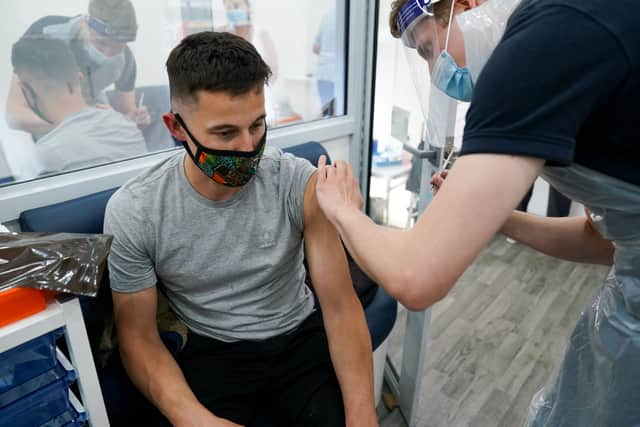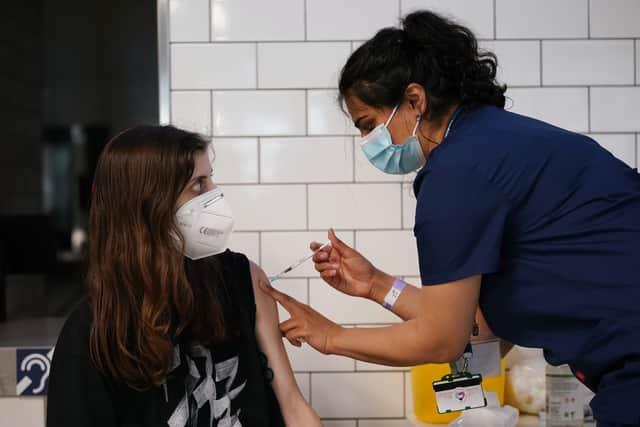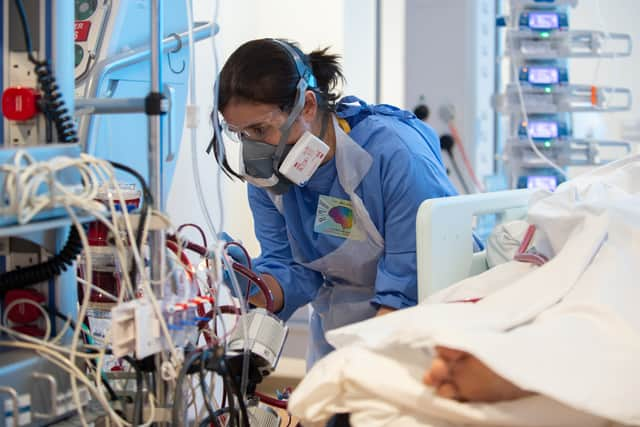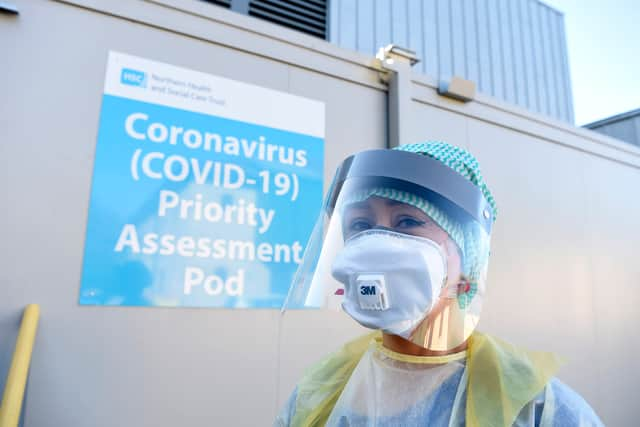Family who refused Covid vaccine die within days of each other
and live on Freeview channel 276
Please scroll down for more on this story.
LIVE UPDATES: Coronavirus NI - 41 in ICU with Covid-19 as CSA Professor Ian Young reveals 80% of under 60s in hospital are unvaccinated
Family who refused Covid vaccine die within days of each other


A mother, father and their adult son who all refused to take a Covid-19 vaccine have died within seven days of each other.
Francis Goncalves, a chef from Cardiff in Wales, blamed anti-vaxxers for spreading the kind of misinformation that he said “confused” his parents and ultimately influenced their decision not to take a vaccine when it was offered to them.
Mr. Goncalves explained how his father Basil, 73, and Charmagne, 65, as well as younger sibling Shaul, 40, who were living in Portugal, started feeling unwell after a family meal together - all three were dead within two weeks.
“They got caught up in a lot of the anti-vaccination propaganda,” explained Mr. Goncalves,
“It preys on people who are afraid and they fall into the trap. The message I want to get out is why would the government want to hurt you by giving you a vaccine? What is the purpose behind it? I’ve spoken to so many people who are terrified of the vaccine and it costs lives.
“My father gave everything,” said Mr. Goncalves.
“He would wear broken shoes so we could have the best.
“He loved mum and she loved him.
“My mother would do anything for us.
“My brother was my best friend,” he said.
Herd immunity for Delta variant mythical and impossible, expert suggests


Herd immunity is “not a possibility” with the dominant Delta variant of coronavirus, an expert has said - writes Aine Fox, PA.
Professor Sir Andrew Pollard, director of the Oxford Vaccine Group, referred to the idea as “mythical” and warned that a vaccine programme should not be built around the idea of achieving it.
Herd immunity is when enough people become resistant to a disease – through vaccination or previous exposure – that it can no longer significantly spread among the rest of the population.
Sir Andrew told a session of the All-Party Parliamentary Group on Coronavirus (APPG): “We know very clearly with coronavirus that this current variant, the Delta variant, will still infect people who have been vaccinated and that does mean that anyone who’s still unvaccinated, at some point, will meet the virus.”
He said while vaccines might “slow the process” of transmission down, they currently cannot stop the spread completely.
He added: “I think we are in a situation here with this current variant where herd immunity is not a possibility because it still infects vaccinated individuals.”
He predicted that the next thing may be “a variant which is perhaps even better at transmitting in vaccinated populations”.
He added: “So, that’s even more of a reason not to be making a vaccine programme around herd immunity.”
The parliamentary group’s chairwoman, Liberal Democrat MP Layla Moran, called on the Government to “re-evaluate their approach” and put together a “new and comprehensive” plan to mitigate the risks from new variants.
She said: “The worrying evidence we heard today suggests that given the emergence of new variants, including vaccine-resistant ones, achieving herd immunity is just a pipe dream.
“The Government’s plan to learn to live with Covid cannot become a byword for abdicating responsibility to the most vulnerable.
“Ministers must re-evaluate their approach and come up with a new and comprehensive, long-term plan to mitigate the risks posed by Covid and new variants.
“That must include showing moral leadership and stepping up efforts to vaccinate the world.”
Sir Andrew said while there might be “bumpiness” in the next six months, there is also likely to be “increasing confidence” with the UK’s situation with the virus.
He told the APPG: “I think this next six months is a really important consolidation phase and in that shift from the epidemic to the endemic, which is the ‘living with Covid’.
“That doesn’t mean that we live with it and put up with it – we still have to manage those cases of patients who become unwell with it.”
Professor Paul Hunter, from the University of East Anglia, said the way infections are reported might need to change as Covid-19 becomes endemic so that people are not “frightening ourselves” with high numbers “that actually don’t translate into disease burden”.
He told the the session: “I think we need to start moving away from just reporting infections, just reporting positive cases admitted to hospital, to actually start reporting the number of people who are ill because of Covid, those positives that are symptomatic.
“We need to be moving towards reporting hospital admissions that are admitted because of Covid, not because they just happen to be positive and they’re being admitted for something else.”
He said the distinction in someone being ill with Covid or because of Covid is not always an easy one to make for clinicians, but added: “I think we’ve got to start moving to that, otherwise as infection becomes endemic we are going to be frightening ourselves with very high numbers that actually don’t translate into disease burden.”
41 in ICU with Covid-19 as CSA Professor Ian Young reveals 80% of under 60s in hospital are unvaccinated


Two further deaths of patients who had tested positive for Covid-19 have been reported in Northern Ireland.
The Department of Health said there had also been 1,305 new confirmed cases in the last 24-hour reporting period.
A total of 2,335,798 vaccines have been administered.
On Tuesday morning, there were 311 Covid positive patients in hospital, with 41 in intensive care.
80% of Covid-19 hospital patients under 60 ‘not vaccinated’


Some 80% of patients in hospital with Covid-19 who are aged under 60 have not been vaccinated, the chief scientific adviser has said - writes Rebecca Black, PA.
Overall in Northern Ireland, around 85% of people aged 18 and over have received their first dose of the Covid-19 vaccine.
A lower proportion of younger people have received the jab, 65% of 18-29-year-olds, and 72% in the 30-39-year-old age group have had their first dose.
On Tuesday there were 311 Covid positive patients in hospital, of whom 41 were in intensive care.
On the same day two deaths of patients who previously tested positive for Covid-19 and 1,305 new cases of coronavirus were reported.
On Tuesday morning, Professor Ian Young said there were more than 100 people under the age of 60 with Covid-19 in hospital, 80% of whom have not been vaccinated.
“Younger people who choose not to get vaccinated have a risk of developing a serious illness which will take them into hospital,” he told the BBC.
“Increasingly we are seeing the benefits of vaccination for international travel.
“Many countries now require evidence of two doses of a vaccine to allow people to travel to them.
“Additionally we see a number of local initiatives where people are encouraging customers to present evidence of vaccination in order to gain entry, whether it is Belsonic or the Feile.
“There are a number of everyday benefits to being able to show that you have had two doses of vaccine as well as the very real health benefits.”
Prof Young also expressed concern at vaccine scepticism.
He emphasised the impact of the vaccine on the virus, pointing out that last December before the jabs had been administered, for every 1,000 Covid cases, 80 patients were admitted to hospital.
“Now with almost 85% of the population vaccinated, for every 1,000 Covid cases, only 22 patients are admitted to hospital,” he said.
“Vaccination has been hugely successful in weakening the link between infection and serious illness.
“That’s something that we’ve been very keen to stress and will continue to do so.”
Earlier this week the department of health issued a Covid-19 factfile aimed at dispelling misinformation.
“The vast majority of people have been receptive to vaccination, there have been some barriers, part of that has been accessibility and we have pop up vaccine clinics available throughout Northern Ireland where people can continue to get the first dose of the vaccine if they haven’t done so,” he said.
“But there are a small number of circulating myths, the idea that vaccines have some effect on fertility, the idea that vaccines involve use of cells from aborted babies, that are simply not true, but which continue to circulate and which deter some people from taking up vaccination, and we just want to highlight that circulating information is simply wrong.”
Comment Guidelines
National World encourages reader discussion on our stories. User feedback, insights and back-and-forth exchanges add a rich layer of context to reporting. Please review our Community Guidelines before commenting.